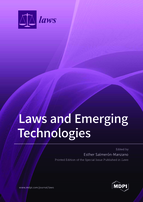Laws and Emerging Technologies
A special issue of Laws (ISSN 2075-471X).
Deadline for manuscript submissions: closed (30 April 2021) | Viewed by 47939
Special Issue Editor
Interests: sustainability; higher education; law; bibliometry; new technologies
Special Issues, Collections and Topics in MDPI journals
Special Issue Information
Dear Colleagues,
The emergence of new technologies of knowledge in all fields, their dissemination, and their application for social or economic benefit are essential activities for the progress of society worldwide. Its development has been essential for international economic and social convergence. However, the regulation and legal implications of these new technologies need to be addressed in the legal systems of every country. Therefore, in order to regulate the basic conditions that guarantee the equality and rights of individuals, legal systems should pay special attention to the legal challenges that new technologies can present. This includes, for example, blockchain technology in the future of contracts, big data, and the protection of personal data; the emergence of electric scooters as a new form of urban mobility; or even the fact that dependence on new technologies can affect one’s personal life, where one seeks the right to disconnect digitally, and even the right to be forgotten.
References:
Conger, S., Pratt, J. H., & Loch, K. D. (2013). Personal information privacy and emerging technologies. Information Systems Journal, 23(5), 401-417.
Levi, M., & Wall, D. S. (2004). Technologies, security, and privacy in the post‐9/11 European information society. Journal of law and society, 31(2), 194-220.
De Hert, P., & Papakonstantinou, V. (2016). The new General Data Protection Regulation: Still a sound system for the protection of individuals?. Computer Law & Security Review, 32(2), 179-194.
Tikkinen-Piri, C., Rohunen, A., & Markkula, J. (2018). EU General Data Protection Regulation: Changes and implications for personal data collecting companies. Computer Law & Security Review, 34(1), 134-153.
Calo, R., & Rosenblat, A. (2017). The taking economy: Uber, information, and power. Colum. L. Rev., 117, 1623.
Prof. Esther Salmerón-Manzano
Guest Editor
Manuscript Submission Information
Manuscripts should be submitted online at www.mdpi.com by registering and logging in to this website. Once you are registered, click here to go to the submission form. Manuscripts can be submitted until the deadline. All submissions that pass pre-check are peer-reviewed. Accepted papers will be published continuously in the journal (as soon as accepted) and will be listed together on the special issue website. Research articles, review articles as well as short communications are invited. For planned papers, a title and short abstract (about 100 words) can be sent to the Editorial Office for announcement on this website.
Submitted manuscripts should not have been published previously, nor be under consideration for publication elsewhere (except conference proceedings papers). All manuscripts are thoroughly refereed through a double-blind peer-review process. A guide for authors and other relevant information for submission of manuscripts is available on the Instructions for Authors page. Laws is an international peer-reviewed open access semimonthly journal published by MDPI.
Please visit the Instructions for Authors page before submitting a manuscript. The Article Processing Charge (APC) for publication in this open access journal is 1400 CHF (Swiss Francs). Submitted papers should be well formatted and use good English. Authors may use MDPI's English editing service prior to publication or during author revisions.
Keywords
- Smartcontract
- Blockchain
- Bitcoin
- Ethereum
- Cryptocurrency
- Big data
- Data mining
- Data privacy
- Insurance
- Right to disconnect
- Smart cards
- Drones
- Electric vehicles
- Property rights
- Law enforcement
- Internet of Things (IoT)
- Royalties
- Data protection
- Land register






